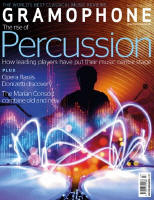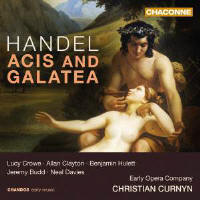Texte paru dans: / Appeared in: |
|
|
Outil de traduction (Très approximatif) |
|
|
Reviewer: Richard Lawrence James Brydges, Earl of Carnarvon – later the Duke of Chandos – lived in some style at Cannons, his Palladian mansion near Edgware on the outskirts of London. His household included a handful of singers and instrumentalists; he also employed a personal chaplain who was an expert on hydraulics, and it’s disappointing to learn that there’s no evidence of a real fountain being used as a stage prop in the open air when Acis and Galatea was first performed. That is a detail from the extremely informative booklet note by David Vickers that accompanies this excellent new recording. Acis and Galatea is not an opera but it can be – and has been – staged. Taken from Ovid’s Metamorphoses, to a text probably by Gay, Pope and John Hughes, the pastoral story tells of Galatea’s rejection of Polyphemus: the giant takes furious revenge by murdering Acis, whom Galatea then turns into a stream. Handel’s characterisation is brilliant, nowhere more so than in the trio where the steady tread of a love duet is infected by Polyphemus raging in shorter notes – rather as Bach was to do in ‘So ist mein Jesus nun gefangen’ in the St Matthew Passion. Handel revised the work in later life but this recording presents the original version, performed in 1718. With an extra soprano, two extra violins and an unexpected theorbo, the line-up is very slightly larger than the ensemble at Cannons; for an exact replication you need to go to John Butt’s version. Christian Curnyn conducts unobtrusively in the main, which I mean as high praise. He takes ‘Where shall I seek the charming fair?’ at quite a lick, the dotted figures springy and precise. Oboist Katharina Spreckelsen’s trill on the sustained high G in the reprise of ‘Love sounds th’alarm’ starts at exactly the right moment; the strings accompanying the death of Acis are suitably hushed, as they are at the end of the following chorus. Only occasionally, as in the fading away of ‘Happy we!’, do you feel the shaping is overdone. Lucy Crowe is an enchanting Galatea: warm and womanly in ‘As when the dove’, full of tender regret in ‘Heart, the seat of soft delight’. Tenderness – without regret – is the hallmark of Allan Clayton’s Acis in ‘Love in her eyes sits playing’, and his tone is always beautiful, even in his vigorous preparation for battle. The best-known number is ‘O ruddier than the cherry’, with its incongruous, penny-whistle accompaniment: Neal Davies, less lumbering than some, almost makes Polyphemus a credible suitor. In this tenor-heavy cast, Benjamin Hulett and Jeremy Budd are mellifluous with, like the rest, excellent diction. Back in 1998 Les Arts Florissants fielded a fine cast, William Christie opting for the soprano Damon and choral end to ‘Happy we!’ of Handel’s later versions. A nearer comparison, in both senses, is the performance by the Dunedin Consort & Players, with a splendid Polyphemus from Matthew Brook. John Butt takes ‘The flocks shall leave the mountains’ at a very deliberate tempo indeed. He pleasingly has ‘Galatea’ pronounced correctly, the third syllable as in ‘tea’. Both recordings are well worth hearing but this new one by the Early Opera Company has the edge.
|
|




